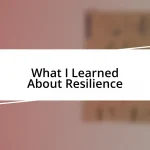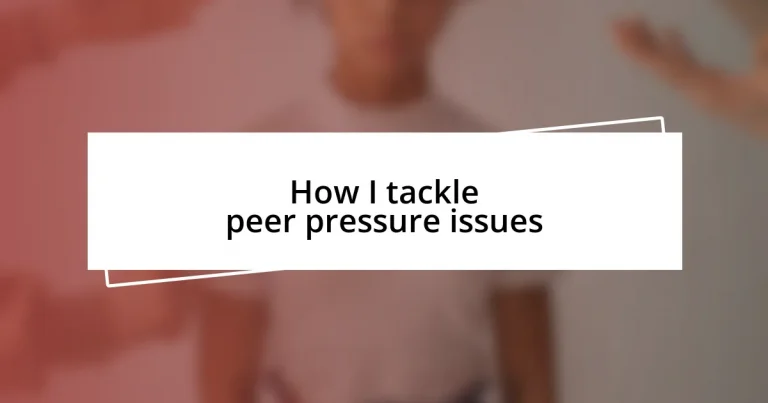Key takeaways:
- Peer pressure can influence behavior and beliefs, pushing individuals towards both positive and negative choices.
- Building self-confidence through self-reflection, setting achievable goals, and positive self-talk is essential for resisting peer pressure.
- Assertive communication and seeking support from trusted friends help reinforce personal values and decisions in social situations.
- Reflecting on personal values serves as a guiding compass, helping individuals navigate peer pressure and maintain authenticity.
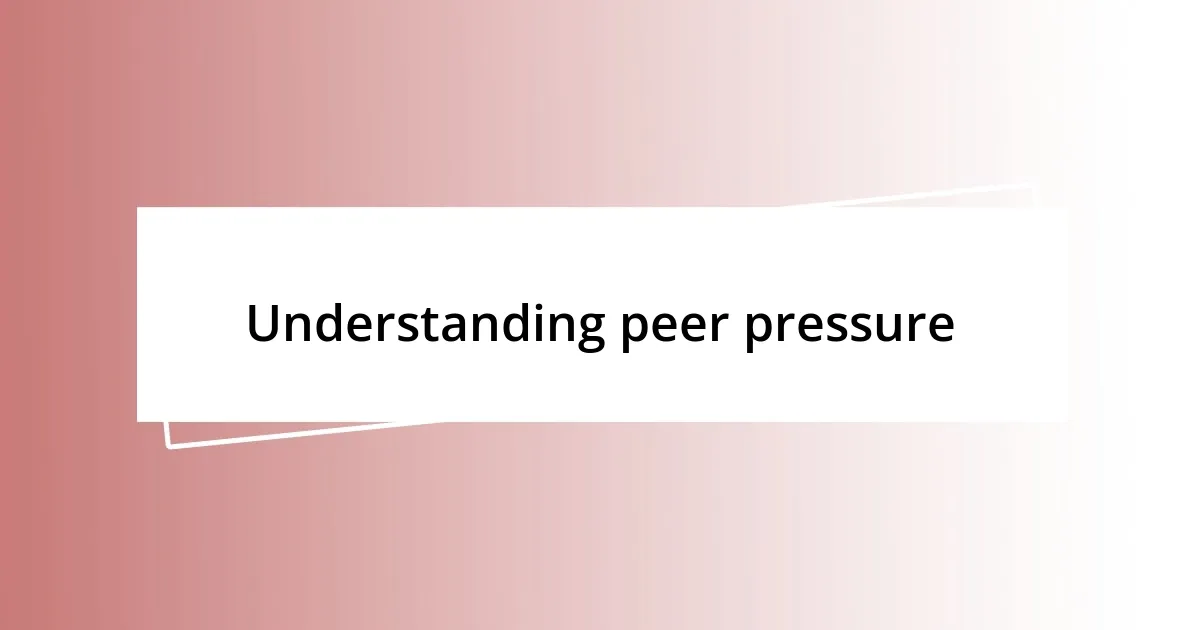
Understanding peer pressure
Peer pressure is a fascinating, yet often misunderstood social phenomenon. It’s that subtle nudge from friends or acquaintances that can sometimes feel overwhelmingly persuasive. I remember sitting in the lunchroom, feeling the heat rise in my cheeks as my friends encouraged me to try a risky stunt. I hesitated, questioning whether this was really what I wanted, yet the shared laughter and excitement made it seem so enticing.
It’s intriguing how peer pressure can be both positive and negative. On one hand, it can push us to try new things and step out of our comfort zones; on the other, it can lead us down paths we might not choose for ourselves. I often reflect on those moments when I succumbed to pressure—it sometimes felt easier to agree than to express my true feelings. Have you ever found yourself in a similar situation, feeling torn between your own instincts and the desire to fit in?
Understanding peer pressure is essential because it often taps into our fundamental need for acceptance and belonging. I’ve realized that while my friends might influence my choices, at the end of the day, I have to live with those decisions. It raises the question: how do we balance the need for connection with staying true to ourselves? It’s a complex dance, and I believe that being mindful of our values and feelings is key to navigating it successfully.
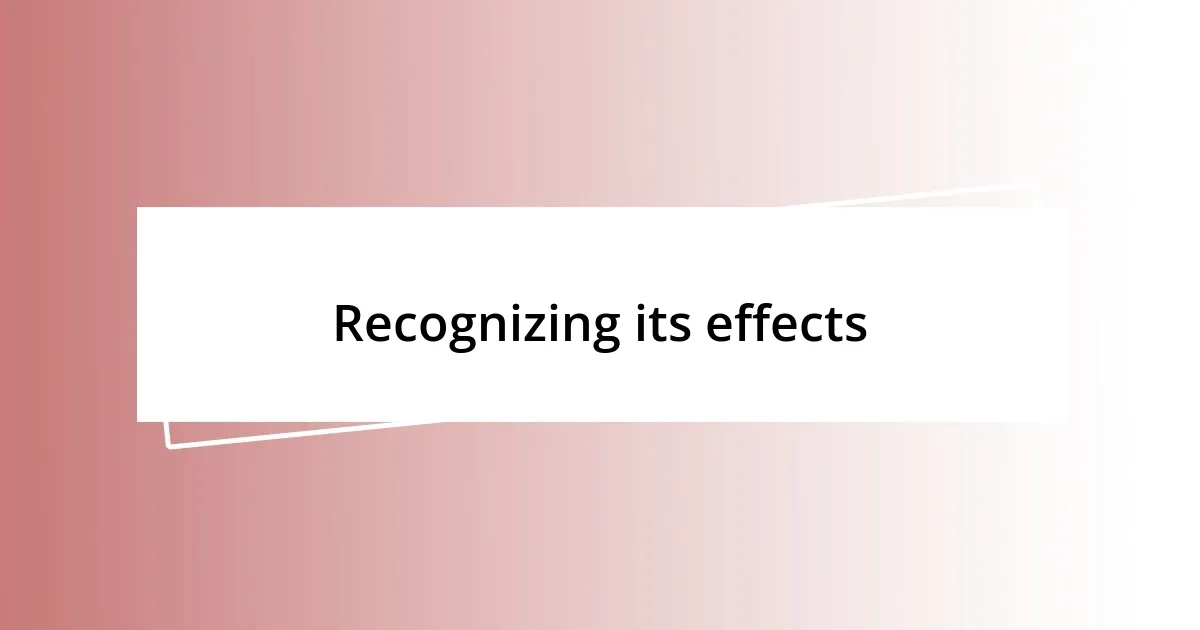
Recognizing its effects
Recognizing the effects of peer pressure can be eye-opening. It often manifests in subtle ways, like shifting our beliefs or altering our behaviors just to gain acceptance. I recall a time when I eagerly went along with friends who wanted to skip class. The exhilaration was palpable, but it also brought a wave of anxiety as I worried about the consequences.
Some effects of peer pressure include:
- Altered self-esteem: You might feel more or less confident based on how you think others perceive you.
- Compromised values: Sometimes, you might overlook your own principles just to fit in.
- Changes in behavior: You may find yourself acting differently, perhaps even engaging in risky actions that don’t align with your character.
It’s crucial to tune in to how such influences shape your choices. I often catch myself reflecting on moments that challenged my authenticity. It’s fascinating how these incidents—including ones that felt exciting at the time—eventually led to regret or self-doubt. This recognition can empower us to navigate our social worlds more thoughtfully.
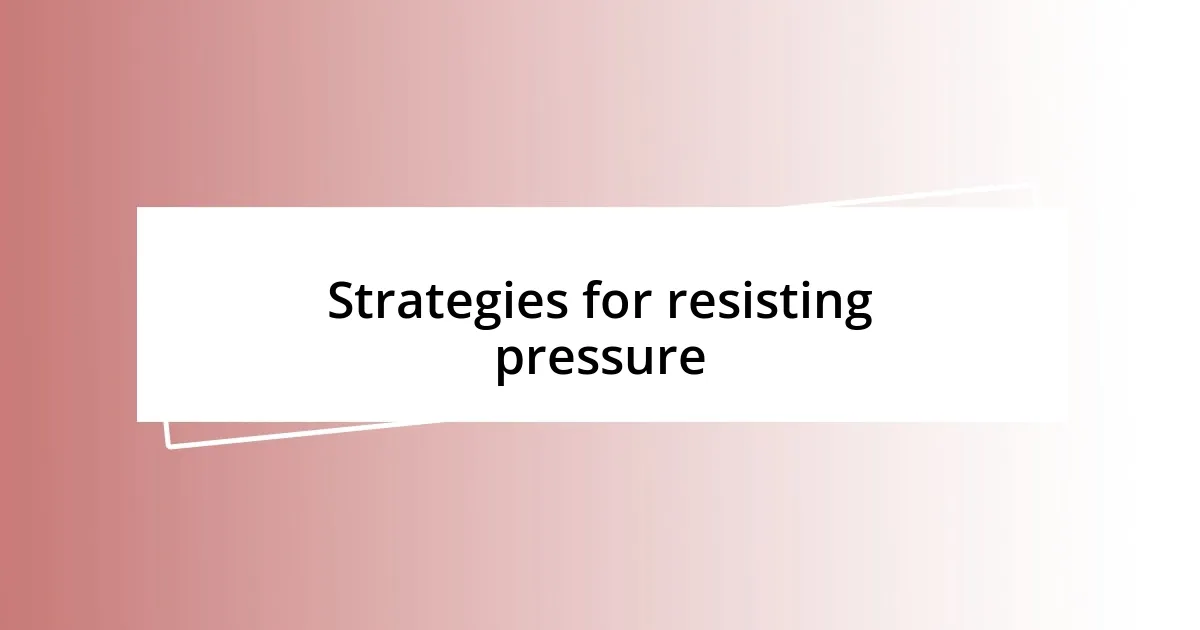
Strategies for resisting pressure
When it comes to resisting peer pressure, I’ve found that having a solid plan makes all the difference. One strategy I adopted is practicing assertiveness. I remember a time when my friends pressured me to drink at a party. Instead of cave to the pressure, I calmly expressed my decision not to drink. This simple act of standing firm felt empowering and helped me realize that it’s okay to prioritize my values.
Another effective method is surrounding yourself with positive influences. I’ve experienced the importance of friendship in moments of pressure. After a tough encounter where I was nudged to act against my beliefs, I chose to spend more time with friends who shared my values. Their support not only helped me feel more confident in my decisions but also created an environment where saying “no” felt natural rather than difficult.
A third strategy is to develop a “game plan” for high-pressure situations. This can involve preparing exit strategies or rehearsing responses to potential scenarios. I remember rehearsing responses before attending a gathering. When the moment arrived and I was faced with pressure, I felt ready, and it made saying “no” much easier. By taking proactive steps, I discovered that resisting peer pressure becomes significantly simpler.
| Strategy | Description |
|---|---|
| Assertiveness | Standing firm in your choices and communicating them clearly. |
| Positive Influences | Surrounding yourself with friends who support your decisions. |
| Game Plan | Preparing responses and strategies for dealing with pressure beforehand. |
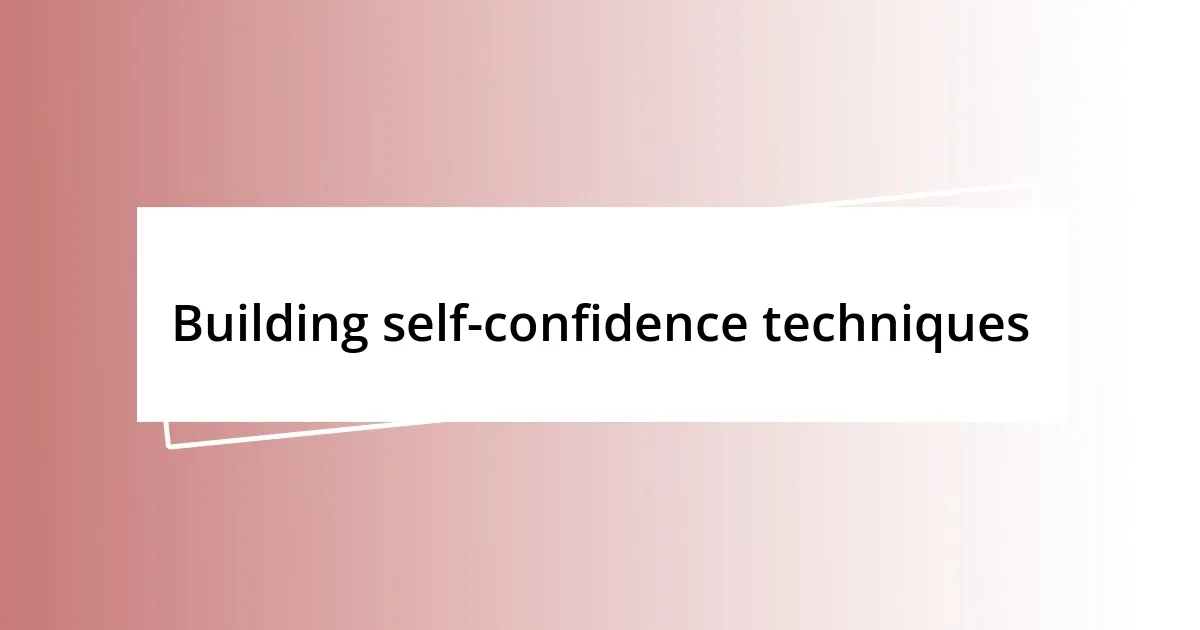
Building self-confidence techniques
Building self-confidence is a journey I find both challenging and rewarding. One technique that has truly helped me is focusing on my strengths. Each time I faced self-doubt, I made it a point to jot down my achievements, no matter how small. For instance, I once celebrated successfully leading a group project at work. Reflecting on that accomplishment not only boosted my confidence in similar future endeavors, but it also reminded me of my capability to handle challenges.
Another powerful method is setting achievable goals. It’s so easy to overlook progress when we aim too high too soon. I learned this the hard way through an overly ambitious fitness goal I set for myself. After struggling with disappointment, I adjusted my approach to focus on small, incremental steps, like committing to a 15-minute workout routine. Over time, these tiny victories accumulated, and I could feel my confidence soar with every accomplishment.
Lastly, I believe in the power of positive self-talk. Instead of putting myself down in difficult situations, I actively remind myself of my worth. There’s a technique I apply called “affirmations,” where I repeat phrases like, “I am strong,” or “I can handle this.” I once felt terrified before a big presentation, questioning if I was good enough. As I recited my affirmations to myself, I noticed a shift in my mindset, transforming that fear into excitement. Why let doubts hold us back when we can reframe our internal dialogue for success?
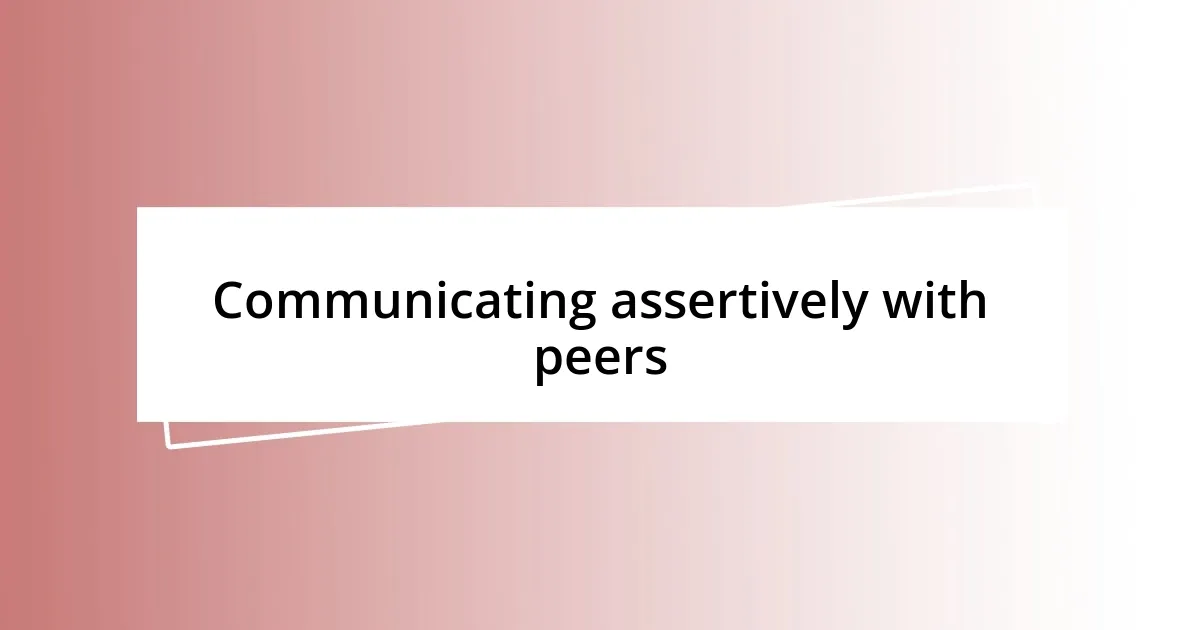
Communicating assertively with peers
Communicating assertively with peers can feel daunting, but I’ve found that clarity is essential. I vividly remember an instance in high school when a close friend suggested we ditch class to go hang out. Instead of hesitating, I took a deep breath and said, “I appreciate the invite, but I really need to focus on my studies today.” It was liberating to express my priorities in a direct manner, rather than simply going along with the crowd.
Assertive communication doesn’t just fight peer pressure; it fosters respect. There was a moment when a group of friends wanted to pressure me into sharing personal information I wasn’t comfortable sharing. I calmly asserted my boundaries, saying, “I’m not ready to talk about that yet.” The surprise on their faces quickly shifted to understanding, and it reinforced my belief that being clear about my comfort zone is healthy for everyone involved. Why should I sacrifice my peace for the sake of fitting in?
I’ve found that tone and body language play a crucial role in assertive communication. I recall a meeting at work where my ideas were overshadowed by louder voices. Instead of withdrawing, I maintained eye contact, spoke clearly, and leaned slightly forward, which conveyed confidence. When I finally delivered my point, the energy shifted, and folks actually paused to listen. It made me realize that how we present ourselves can be just as important as what we say. Are you ready to share your voice and embrace assertiveness?
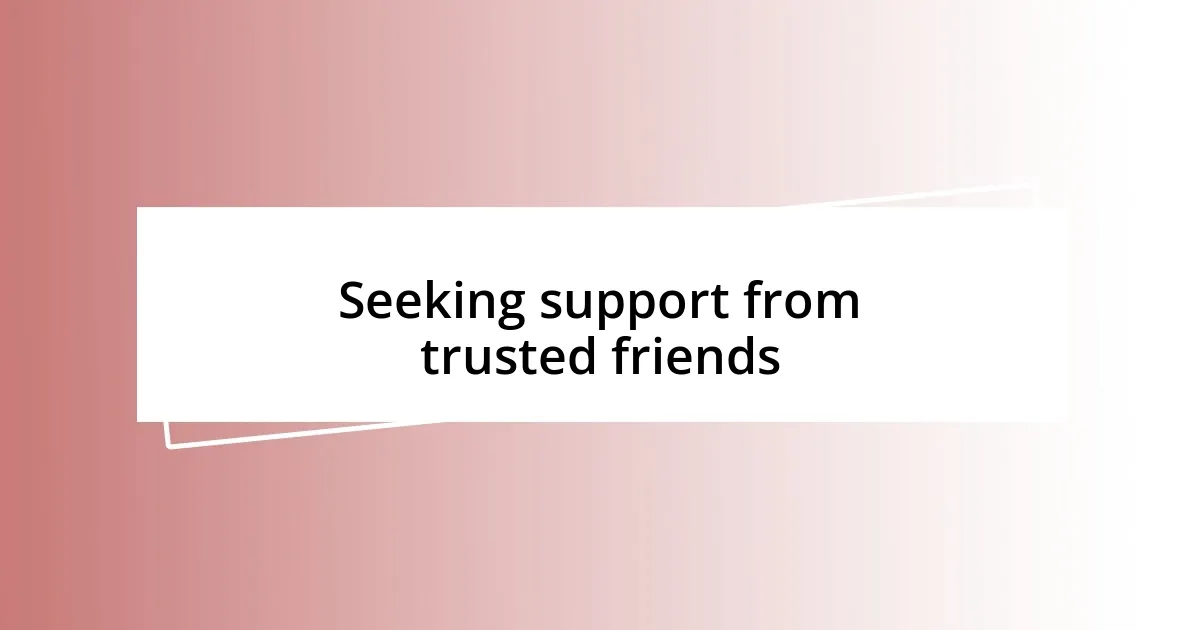
Seeking support from trusted friends
Turning to trusted friends in times of peer pressure is something I deeply value. I remember a weekend outing where everyone was pushing for a night of partying, but my instinct told me otherwise. I called my best friend, and the moment I expressed my hesitation, she instantly got it. “Let’s just have a cozy movie night instead,” she suggested, transforming my feelings of isolation into relief. It’s amazing how just one supportive voice can change your entire mindset.
What I’ve noticed is that these conversations with friends create a safe space for honesty. One time, I confided in my close circle about feeling pressured to conform to a lifestyle I wasn’t comfortable with. Instead of judgment, they responded with legitimate concern and shared their own experiences, signaling that it’s perfectly normal to feel this way. It’s moments like these that reassure me that I’m not alone in my journey, and such openness can significantly lessen the weight of peer pressure. Have you ever experienced a moment of connection like that?
Moreover, leaning on friends not only builds resilience but also strengthens those bonds. Recently, after I chose to walk away from a potentially risky situation, my friends rallied around me with support and validation. Their encouragement wasn’t just comforting; it reinforced my decision and made me feel empowered, knowing that I’m surrounded by people who respect my choices. When faced with challenging social scenarios, wouldn’t it be great to have that network to lean on?
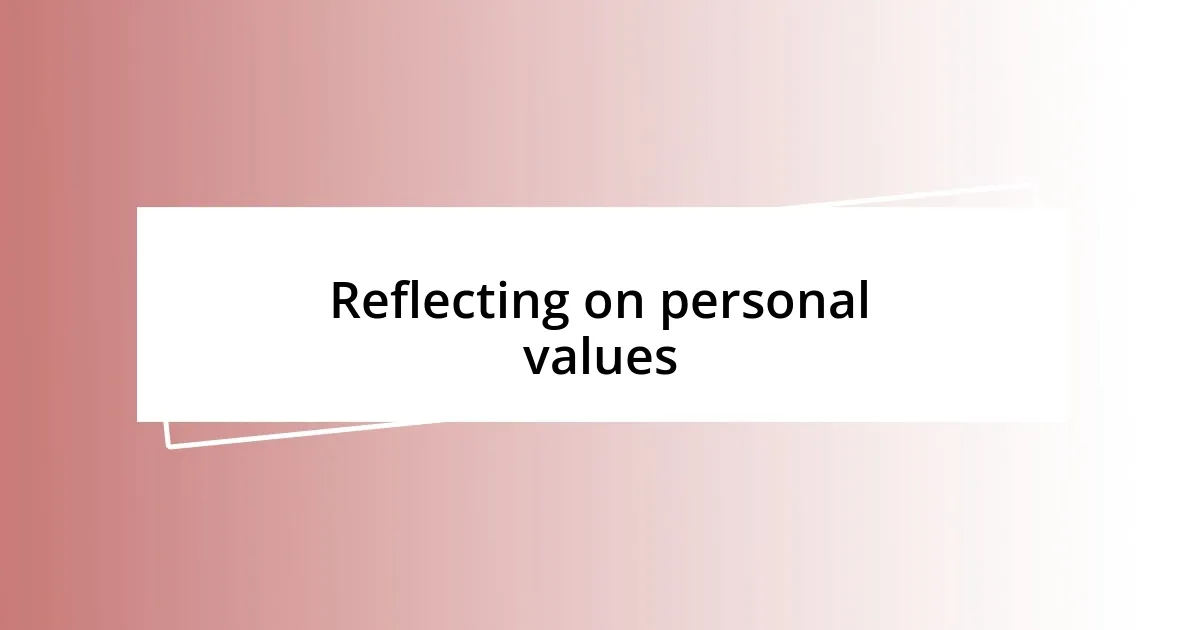
Reflecting on personal values
When I take a moment to reflect on my personal values, I find that clarity becomes my compass. For instance, during a stressful period in college, I often felt torn between joining the party scene and focusing on my academic goals. One evening, sitting alone with a cup of tea, I asked myself what truly mattered. I realized that my commitment to learning outweighed the fleeting fun of those parties. It was a small yet powerful moment that shaped my choices moving forward.
I’ve learned that understanding our values is key to resisting peer pressure. One time, while hanging out with a group of friends, they joked about skipping an important event that I had been looking forward to. Instead of brushing it off, I spoke up. I said, “I value attending this event because it’s important to me and my growth.” The nods of my friends were all it took for me to feel stronger in my decision. It reminded me that when we articulate our values, we not only reinforce our boundaries but also inspire others to reflect on theirs.
In my experience, sometimes it’s simply about taking a step back and asking, what do I stand for? I vividly remember a situation where I was offered a shortcut that seemed harmless. After a moment of contemplation, I realized that integrity was a value I held dear. I opted for the harder path instead, feeling a sense of pride wash over me. Do you ever pause to analyze what values guide your decisions?
